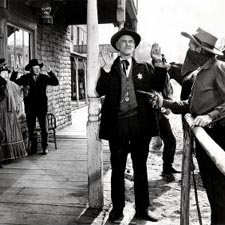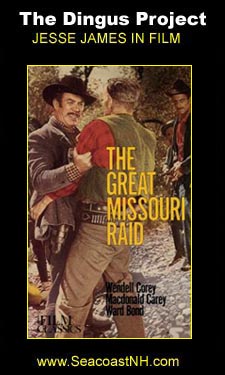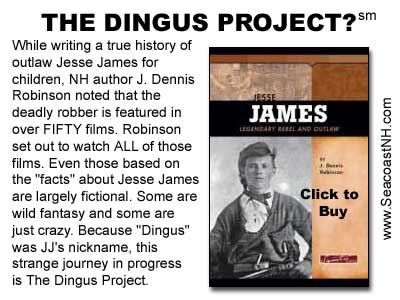| The Great Missouri Raid |
 THE DINGUS PROJECT
THE DINGUS PROJECT
Jesse James in Film #07
Historical accuracy is rare in films about Jesse James, but this old B-movie makes a solid attempt to tell the story straight. No horses jumping through windows. No Robin Hood legend. Just the facts in a well-constructed drama. The Dingus Project recommends it highly for those who want to know what really happened.
The Great Missouri Raid (1951)
83 minutes
Wendell Corey, Macdonald Carey, Ward Bond

Actress Anne Revere played Zerelda and was blacklisted the year the movie was filmed. She did nor perform again for 20 years. She opens the film with this passionate monologue:
"This is the story of Frank and Jesse James and the men who rode with them. They were desperate men, the most notorious outlaws of all time. It’s hard for me to say this because I knew them, knew them so well. The James boys, they were my sons. Outlaws? They were outlaws, but they didn’t start that way. Frank, Frank my oldest son, a great mind turned to crime, an unhappy man who could never escape from himself. Jesse, Jesse James, my youngest son, who fell to the bullet of one of his own kind, his kind because, sick for revenge, he chose to be an outlaw … Wrong? Yes, they were wrong. But remember they lived in a time of violence in an age of strife, men dedicated to what was to become the Lost Cause. They started as soldiers in a war. You call the war between the states the ‘Civil War,’ but where we lived in western Missouri it was worse than war. It was neighbor against neighbor, with blazing torch and lash and the hangman’s rope."
The lead roles here belong, not to superstars as is too often the case, but to veteran stage, "B" movie and TV actors Macdonald Carey as Jesse and Wendell Corey as Frank. Credit for the historical accuracy here seems due to writer and director Frank Gruber who penned many TV and film westerns. He knew the real story and followed the arc of truth, sticking to the brutal drama inherent in the true story. The film opens with the outlaws attempting to cash in on the promised amnesty from the state of Missouri. But they discover it does not apply to "Bushwackers" who fought outside the Confederate army as the James brothers did.
Actors Corey and Carey are at least a dozen years too old to play the teenaged James brothers, but no one seems to notice they are just a bit younger than their mother. As in real life, Jesse is wounded during an attempt to surrender and goes off to recuperate in Nebraska. "The war’s over and there’ll be no more killing!" mother James (remarried as Mrs. Samuel) says. "It’s not over, not for us," the boys say.
By drawing out the original story, and drawing in the guerilla reprisals going on even after the war, viewers get a much clearer view on what turned the James brothers to crime. They choose to be outlaws as much as they are forced into it. Certainly the film offers the bad environment as an excuse, but it avoids the oversimplification of most films. "We’re already outlaws," the Younger brothers announce, "let’s get paid for it." Frank James is reticent. "We’re outlaws because of what we did during the war, but robbing banks…"
The film follows closely to the actual progression of robberies, the raid on the James (Samuels) farm, the institution of Order #11 that removed locals from their homes during the Civil War, etc. Even old Doc. Samuels, Zee’s thurd husband, is accurately portrayed. The gang evolves to robbing trains and learns to live on the run under assumed names. The boys fall in love, get married, fight with each other, and try to get out of the robbery game.
In one major plot device, the role of Governor Trowbridge and detective Allan Pinkerton are compressed into one character, but skillfully. The finale plays out on film much as it did in reality with Jesse James shot in his own home by Bob Ford. "Bea" runs in after hearing the shot, cradles Jesse in her arms, and the credits role. Not bad. Not bad at all.
Copyright © J. Dennis Robinson. All rights reserved.
INTERNET MOVIE DATABASE – IMDb web page link


